Top 20 Benefits of Anger Management
Anger is a natural human emotion, but when it becomes overwhelming or out of control, it can lead to serious personal and professional challenges.
According to recent studies, approximately 1 in 10 adults in the United States experience difficulty managing their anger.
If left unchecked, anger can strain relationships, harm physical health, and even lead to workplace or legal troubles.
Anger management is more than just suppressing emotions. It’s about understanding, expressing, and coping with anger in healthy ways.
Whether through techniques like deep breathing, communication skills, or relaxation exercises, anger management provides tools to control frustrating situations calmly and constructively.
Anger management benefits are more than reducing emotional outbursts. It can improve relationships, boost mental clarity, and even lower risks of stress-related illnesses such as high blood pressure and heart disease.
This blog explores anger management’s key advantages and strategies for regaining control of one’s emotions.
Whether you’re seeking help for yourself or a loved one, understanding the benefits is the first step toward a healthier, more balanced life.
20 Benefits of Anger Management
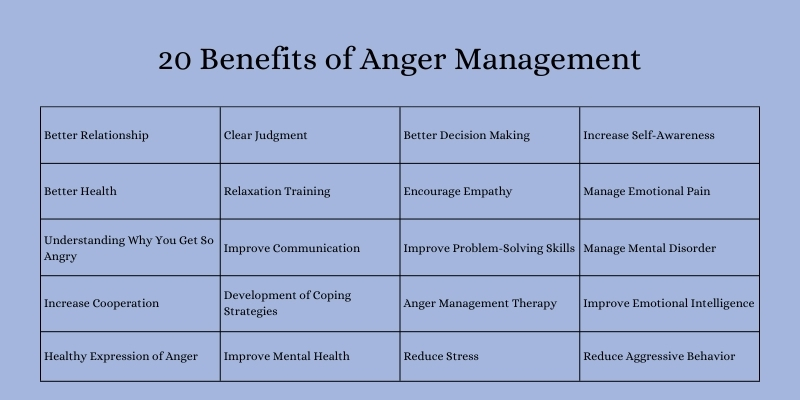
Anger management is more than staying calm, it’s a transformative practice that improves emotional health and overall quality of life.
Managing anger effectively helps individuals channel their emotions constructively, leading to better relationships, improved mental and physical well-being, and enhanced self-awareness.
This approach doesn’t suppress anger but teaches how to express it healthily and productively. Below are some of the most significant benefits of anger management:
1. Better Relationship

Anger can strain relationships, leading to misunderstandings and conflicts. Anger management helps individuals communicate more effectively, promoting healthier connections.
Individuals can express themselves constructively without hurting others by learning to identify and control emotional triggers.
This improved communication reduces tension and strengthens bonds with loved ones, colleagues, and friends. The result is a more harmonious and fulfilling relational dynamic.
2. Better Health

Chronic anger hurts physical health, contributing to issues like high blood pressure, heart problems, and weakened immunity.
Anger management teaches techniques like deep breathing and anger management exercises, which lower stress levels and promote overall well-being.
This improved control boosts mental health and reduces the risk of stress-related illnesses, enhancing quality of life.
3. Understanding Why You Get So Angry

Understanding the root causes of anger is key to managing it. Anger management following anger assessment helps individuals uncover underlying triggers, whether emotional, environmental, or psychological.
By identifying these causes, people can address them more effectively, fostering self-awareness and reducing the frequency of outbursts.
4. Increase Cooperation

When managed correctly, anger can highlight issues that need resolution. By addressing conflicts constructively, individuals encourage collaboration and find common ground.
This approach leads to better problem-solving and cooperation, particularly in professional or group settings.
5. Healthy Expression of Anger

Anger doesn’t need to be destructive. Anger management encourages individuals to express their feelings in a controlled and non-confrontational manner.
Healthy expression allows for emotional release without harming relationships, promoting emotional balance.
6. Clear Judgment

Uncontrolled anger often clouds judgment, leading to impulsive decisions. Anger management helps individuals pause and reflect before reacting, ensuring more thoughtful and rational responses. Improved judgment leads to better personal and professional outcomes.
7. Relaxation Training

Relaxation techniques, such as meditation and progressive muscle relaxation, help calm the mind and body during stressful moments.
Anger management incorporates these practices, providing individuals with tools to reduce stress and control emotions.
8. Improved Communication
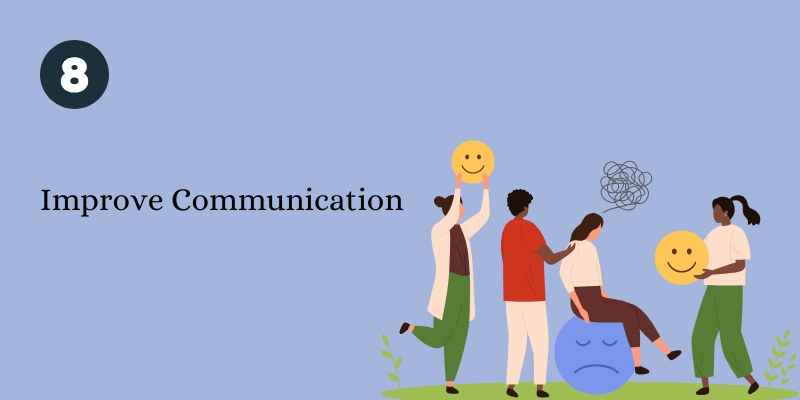
Effective communication is vital in managing anger. Anger management teaches individuals to express themselves clearly and respectfully, avoid misunderstandings, and promote open dialogue. This skill strengthens relationships and promotes mutual respect.
9. Development of Coping Strategies
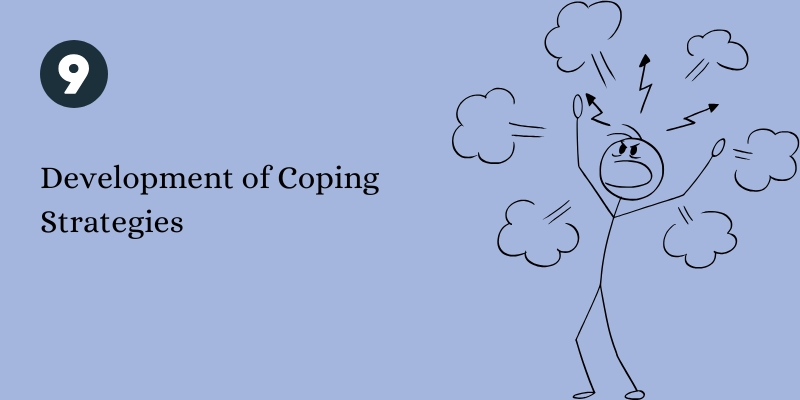
Life is full of stressors, but anger management equips individuals with coping strategies to handle them constructively.
Techniques like journaling, mindfulness, or physical activity provide outlets for frustration, reducing the likelihood of angry outbursts.
10. Improved Mental Health
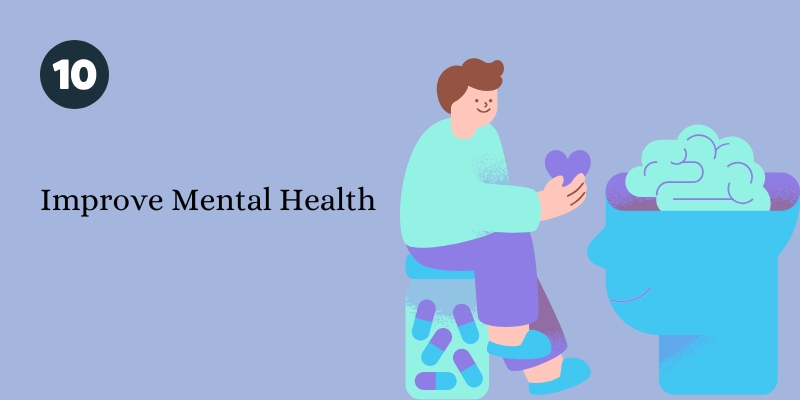
Uncontrolled anger often leads to anxiety, depression, and other mental health challenges. By managing anger, individuals experience reduced stress and greater emotional stability.
This not only enhances mental well-being but also improves overall life satisfaction.
11. Better Decision Making

Uncontrolled anger often leads to hasty decisions that may have long-term negative consequences. Anger management encourages individuals to pause and think before reacting.
By understanding emotional triggers and using techniques like deep breathing or counting to ten, people can make thoughtful decisions rather than impulsive ones.
This skill is particularly valuable in professional and personal settings, leading to better problem-solving and improved relationships.
Over time, better decision-making becomes a natural habit, contributing to overall life success.
12. Encourage Empathy

Anger often narrows perspective, making it difficult to see things from another person’s point of view. Anger management emphasizes understanding others’ emotions and fostering empathy.
By recognizing how actions and words affect others, individuals can build stronger connections and resolve conflicts more compassionately.
Encouraging empathy reduces anger and creates a foundation for deeper, more meaningful relationships, improving interactions in every aspect of life.
13. Improve Problem-Solving Skills

Many anger episodes arise from unresolved issues. Anger management teaches practical problem-solving strategies to address these challenges.
Techniques include identifying the problem, brainstorming solutions, and evaluating outcomes. This structured approach reduces frustration, minimizes misunderstandings, and creates a sense of accomplishment.
Strong problem-solving skills help in personal growth and create opportunities for positive change.
14. Anger Management Therapy
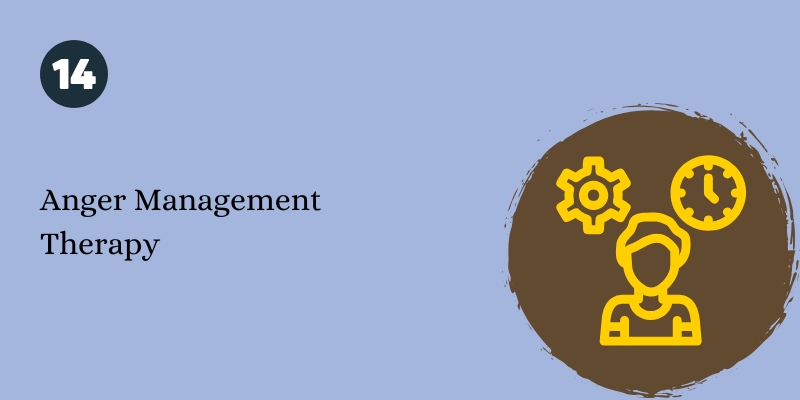
Anger management therapy is a structured process that helps individuals recognize and control anger. It involves learning relaxation techniques, cognitive restructuring, and communication skills.
Therapy sessions often include exercises to identify triggers and develop healthier responses. Whether conducted individually or in groups, anger management therapy provides a supportive environment to practice emotional regulation.
15. Reduce Stress
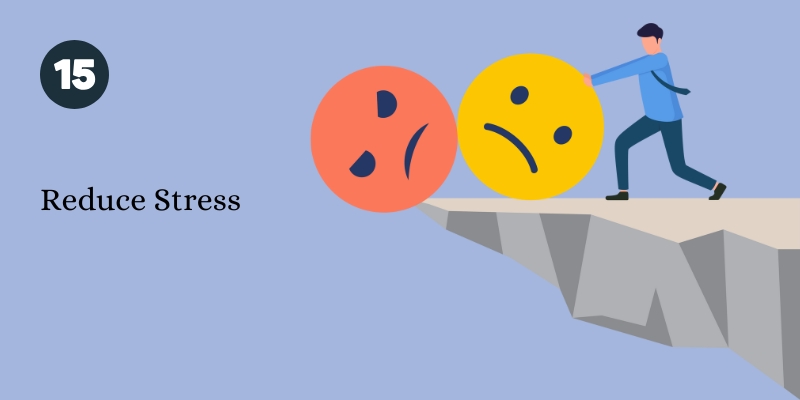
Chronic stress is closely linked to uncontrolled anger. Anger management techniques, like mindfulness and relaxation exercises, help alleviate stress.
Reduced stress levels improve overall well-being, making it easier to control life’s challenges without resorting to anger.
Stress reduction also positively impacts physical health, lowering the risk of heart disease and other illnesses.
16. Increase Self-Awareness

Understanding personal triggers and emotional responses is essential for anger management. Self-awareness allows individuals to recognize patterns in their behavior and address them proactively.
Techniques such as journaling, mindfulness, and reflection help deepen this understanding. Increased self-awareness leads to better control over emotions and improve personal growth.
17. Manage Emotional Pain

Anger is often a mask for deeper emotions like sadness, fear, or frustration. Anger management helps individuals uncover and address these underlying feelings.
By exploring the root causes of their anger, people can work through emotional pain and achieve healing. Recognizing these hidden emotions fosters emotional resilience and improves mental health.
18. Manage Depression or Other Mental Disorder
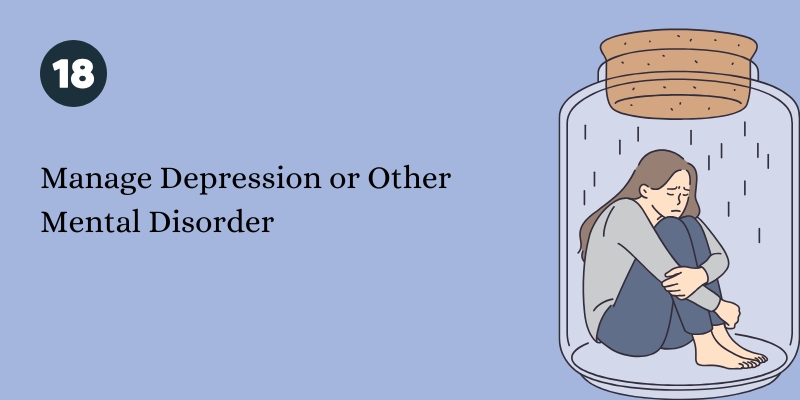
Unchecked anger can contribute to or exacerbate mental health issues like depression and anxiety. Anger management provides tools to regulate emotions, reducing the impact on mental well-being.
Therapy and coping strategies help individuals address anger constructively, creating a path toward emotional stability and improved quality of life.
19. Improve Emotional Intelligence

Anger management enhances emotional intelligence by teaching individuals to recognize and regulate their emotions. This skill involves understanding how emotions influence behavior and effectively managing interpersonal relationships.
High emotional intelligence leads to better conflict resolution, stronger connections, and a more balanced life.
20. Reduced Aggressive Behavior
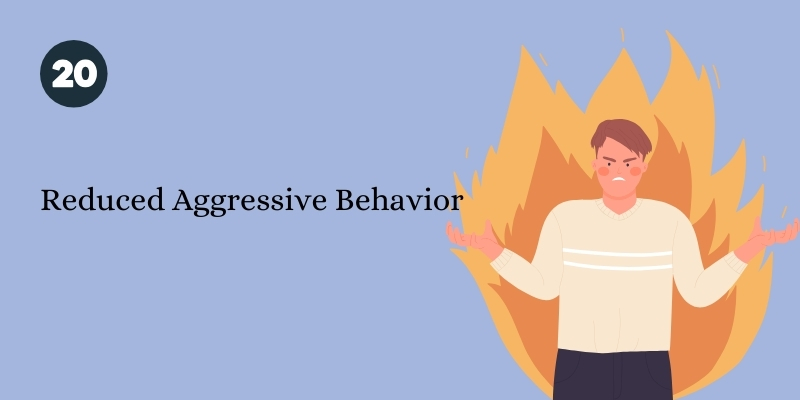
One key benefit of anger management is the reduction of aggressive tendencies. Individuals can respond to conflicts calmly and constructively by learning to control anger.
Reduced aggression improves relationships and creates a safer, more harmonious environment for everyone involved.
Frequently Asked Questions
What are the benefits of anger management?
Anger management helps improve relationships, mental health, and decision-making. It also reduces stress, enhances emotional intelligence, and encourages healthier communication.
Who benefits from anger management?
Anyone struggling with frequent or intense anger can benefit, including individuals, couples, and professionals. It is especially helpful for those seeking better emotional regulation and stronger relationships.
How can anger management help?
It teaches coping strategies, identifies triggers, and promotes constructive responses. This helps individuals manage their emotions, reduce conflicts, and improve overall quality of life.
What is the positive effect of anger?
When expressed constructively, anger can motivate change, highlight personal boundaries, and increase cooperation by proactively addressing underlying issues.
Conclusion
Anger is a natural emotion, but when left unmanaged, it can disrupt relationships, harm mental and physical health, and hinder personal growth.
Anger management offers a structured way to channel this powerful emotion into positive outcomes.
By learning to identify triggers, practice relaxation techniques, and develop constructive communication skills, individuals can transform anger into a tool for self-awareness and improved relationships.
Anger management benefits go beyond emotional regulation. It promotes better decision-making, encourages empathy, and strengthens problem-solving abilities.


2 Responses